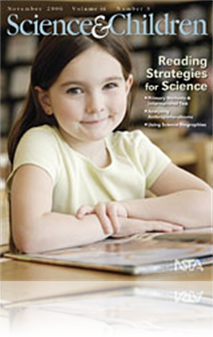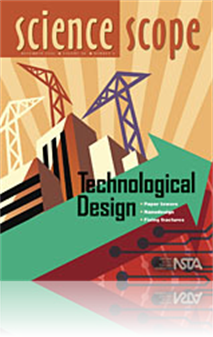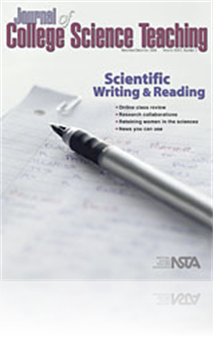All Resources
Journal Article
Using technology to Blend Teaching and Basic Research
The CHANCE (Connecting Humans and Nature in the Costa Rican Environment) program is a coordinated effort between The Pennsylvania State University (PSU) and the Pennsylvania Department of Education (PDE) that trains 9th- through 12th-grade teachers ...
Journal Article
Using Biographies in Science Class
One fifth grade teacher recalls the conversations that took place in grad school regarding the nature of science and science as a human endeavor after her fifth grade students inquired about what a scientist looks like. Students shared descriptions ...
Journal Article
Nanomedicine: Problem Solving to Treat Cancer
Students rarely have the opportunity to delve into the unknown and brainstorm solutions to cutting-edge, unsolved science problems that affect thousands of people. To counter this trend, the following activity was developed to expose students to issu...
Journal Article
Favorite Demonstration: Using a Demonstration for an End-of-Semester Review
Demonstrations are an ideal way to end a course, and can be much more than a fun or even memorable diversion before the intense week of final exams. When paired with an in-class worksheet, they can serve as an excellent course review mechanism, offer...
Journal Article
Science Sampler: Catapulting into technological design
Unleash your students' interest in technological design by implementing this exciting, hands-on activity into your science curriculum. In this activity, students explore levers by designing and building a working catapult. Each catapult is tested for...
Journal Article
Science 101: Why is Pluto no longer a planet?
On August 24, 2006, the International Astronomical Union (IAU) decided that Pluto was no longer a planet, but rather a "dwarf planet". Our understanding of the solar system has not undergone any radical changes, our understanding of Pluto did not ch...
Journal Article
Teaching Through Trade Books: Moving My Body
The human body is amazing! This month's trade books help students understand their growing bones, muscles, and joints while engaging in some investigations to help them become aware of their bodies and how exercise helps their bodies stay strong....
Journal Article
Primary Students and Informational Texts
Anyone who has spent time looking into science books with young children has no doubt experienced the endless questions that the information and visuals in the books can stimulate. Can snakes climb trees? How do frogs hide from predators? Why do v...
Journal Article
This article presents an approach for integrating instruction of scientific writing and reading into undergraduate science courses, inspired by the pedagogical theory of cognitive apprenticeship. Included, is a demonstration of its implementation and...
Journal Article
Retaining Undergraduate Women in Science, Mathematics, and Engineering
The purpose of this research study was to examine the effectiveness of a program in retaining women in science, mathematics, and engineering majors. Undergraduate women participating in a support and mentoring program were compared with nonprogram ...
Journal Article
Editor's Roundtable: Classroom benefit of being bionic!
The National Science Education Standards indicate that “technology as design is included in the Standards as parallel to science as inquiry.” As a result, this issue of Science Scope contains a collection of design and construction activiti...
Journal Article
Science Shorts: Seeing is Believing
Many students enjoy the reading about new worlds or imaginary places. The world of microscopy can generate the same kind of excitement and help children rethink the immature idea that only what they see exists. This month's Science Shorts explores ...
Journal Article
Since the passage of No Child Left Behind (NCLB) in 2002, and the amendments to the Individuals with Disabilities Education Act in 2004, the majority of students with learning disabilities take science courses as part of the general-education middle ...







